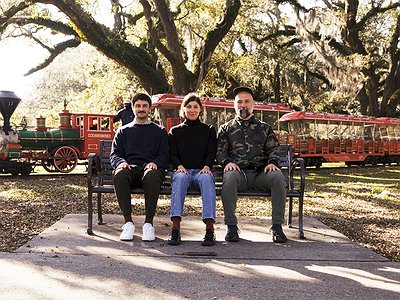Name: TRAX ONLY
Members: Father Figure (Mark Louque), Kathi Kniess, and Bouffant Bouffant (Brett LaBauve)
Nationality: American
Occupation: Producers, DJs,
Current release: TRAX ONLY has released a remarkable three-part sampler called Soft Touch Express. The release is complemented by a magazine, which includes "a series of conversations with our contributing artists and reflections from friends familiar with the scene." Available from the TRAX ONLY Bandcamp page.
If this TRAX ONLY interview piqued your interest, visit them on Facebook or Bandcamp for updates, thoughts and music.
Soft Express Touch is a truly amazing three-part collection of "artists near and dear, plucked straight from the queer dance floor". But it is also an expression of a community. Can you tell me a bit about this community and how it got started?
BRETT: Most of the artists of SOFT TOUCH EXPRESS are part of a large and growing web of queer underground nightlife people from the US. Crews like Honey Soundsystem and Honcho were some of the first to start organizing the types of parties that operated outside of the mainstream gay nightclubs. Many of the artists on the compilation are responsible for pushing an inclusive, queer, house and techno agenda in there respective cities, similar to the aforementioned crews while evolving and tackling issues and embracing what’s unique about there city. We’ve all gotten to know each other through booking each other to DJ at our respective parties throughout the year and keeping in touch via social media and DJ mix series. We have found a family of like minded people, spread far and wide with the glue binding us being the music and inclusive practices. Our hope was that the compilation serve as a survey of this scene, especially in the past year as we could not be together physically, the compilation brought us together in spirit.
Several important questions were a point of departure for the compilation: Why we do what we do, what we love about it, and how to grow it beyond ourselves. Could you give a brief hint at your current answers to these questions?
KATHI: These were actually the questions that motivated the Soft Touch Express zine, a 95-page publication featuring interviews with the artists on the compilation. Once we decided to release the compilation, we realized that due to the hugely disruptive factor of the pandemic it was just as important to showcase the stories behind the music. What had the DJs in our community been up to during this time?
Add to that the protests against racial violence in the US last summer, and the urgency for a shift in consciousness in many industries, including nightlife. Are the lineups and crowds reflecting the queer and Black roots of electronic music today? Where do we position ourselves as underground promoters amidst a nightlife industry that has ballooned into a multi-million dollar festival-driven machine that sometimes forgets that the club started as a place where marginalized people could experience momentary freedom?
To me, the pandemic has been an opportunity to check in. As Bezier said in his interview: this time has been an “active practice of deprioritization”- what do we keep and what do we shed? Even in the underground there is a lot of room for improvement and I was curious to know what ideas our contributors might have, while at the same time celebrating the love we have for the music, the parties, and for each other.
In the press release, you describe New Orleans as a city "known for its decadence, no last call, and a crowd that defies binaries." How do you explain this freedom and openness?
MARK: New Orleans, a city surrounded by water with access to global trade routes, is arguably the most important (and fought over) gateway to the United States. The port was most active in the early 1800s during the height of the slave trade. While this was certainly the most embarrassing time in American history it did disburse an eclectic mix of cuisines, traditions, and sounds throughout our city that are connected to Caribbean, African, Spanish and French cultures, providing the ingredients to make this the most unique city in America with the most vibrant personalities.
New Orleans hasn’t gone without tensions and corruptions but thriving here requires a level of acceptance and tolerance. It’s a breeding ground for individuality, freedom and openness. This is visible in the way people dress, sing, eat, make art, and express themselves. We stand in awe of each other’s creativity and boldness: it is celebrated. This is what attracts people to this place like pirates looking to steal its treasure. But New Orleans survives the looters and remains extraordinary because you can’t take it with you!
You also speak about the issue of sustainability in the press release. This is something an organisation like Berlin Collective Action over here in Germany is also working on. What are the specific challenges for the queer nightlife community in this regard?
KATHI: When we talk about sustainability in the States regarding the queer nightlife community, we specifically mean financial sustainability. Unlike Europe, most of the US lacks much of the infrastructure that would make nightlife a financially sustainable line of work. Berlin is famous for its abundance of well-staffed, well-attended clubs, most with excellent sound, proper safety regulations, etc. Nightlife is actively supported by the city government in the shape of tax breaks, grants and even advertising, and a recognition that nightlife is a major tourist attraction and therefore worthy of endorsing and collaborating with.
When we look at the situation in the US, especially in smaller cities like New Orleans, clubs are basically non-existent. Raves are built from scratch: you rent the space (sometimes under dubious/ illegal circumstances), you bring in the DJ booth, the equipment, the speakers, the bar, the door staff ... everything is DIY, and that comes with risks and dangers.
New Orleans thankfully has no last call and a permissive bar landscape that allows us to throw smaller parties and “transform” the space for the night - a big reason why parties like Trax Only work there. But in terms of money, the smaller crowds often mean a break-even situation, sometimes a loss. It can mean smaller fees for DJs and staff, and a lot of underpaid work for the promoters. Even in larger cities, for example Los Angeles, many of the big raves happen in illegal warehouses that can accommodate larger crowds and produce considerable revenue. The risk of not making your money back can also make you book differently as a promoter: a well-known headliner is often a must in order to sell enough tickets and make your money back. More importantly, there’s always the risk of getting shut down by the police. For many promoters that can mean a huge financial setback that prevents them from organizing further events. Add to that the cultural demonization of nightlife, often reflected in legislation, or simply the fact that most cities have to stop serving alcohol at 2am, and you end up with a very unprotected, “underground,” line of work.
Despite these challenges, the DIY style of nightlife in the US is also absolutely incredible, since it’s a labor of love for many, especially in the queer community. When you have to rely on your community to put on an event, it becomes everyone’s party.
Things are getting harder for artists in these aggressively neoliberal times, but I think there are many opportunities to organize, to employ each other, to create our own economy where we can, and to divest from corporate capitalist structures. The Soft Touch Express project itself was made possible through generous donations from people in our community. As Ariel Zetina pointed out in her interview for our zine, are you still paying your headliner $1,000 and your opener $100? And no drink tickets?? Redistribution of resources can happen in many forms!
Can you please tell us a bit about your own sense of identity – and how it motivated you to take an artistic path?
MARK: Growing up in a small Louisiana farm town as a gay boy I never really fit in anywhere. Even after going to college and discovering other gay people I sitll didn’t feel like I fit in. It was clear that I had to create my own reality and soon I found others doing the same. Leading to endless fruitful collaborations and new found ideas of queerness. The lesson here is: stay true to yourself, be open and available, then say yes to everything until you find what you seek.
BRETT: As a gay man who also grew up in a very small rural Louisiana town I spent my youth impatiently waiting until I was old enough to get out of there, but until then I escaped in the solitude of music and art. That pensive time waiting for something more ultimately ignited an intense sense of wanderlust and adventure in me that I’m forever thankful for. I feel very lucky that I am able to combine music with traveling by DJing, meeting a community of people I grew up dreaming of knowing as well as allowing me to connect with and build local community.
KATHI: I grew up all over the place, mostly in different countries in Latin America and in Germany. The frequent moves and having a bi-cultural background made me feel inadequate a lot of the time. Eventually my family moved to Berlin when I was 15 and nightlife became a huge escape and fascination for me, seeing people becoming themselves at night, it felt like freedom.
There have often been claims that artists from different social groups approach music differently. In the light of Soft Touch Express, how do you see that yourself?
KATHI: If I understand the question correctly, class, gender and race obviously play as big of a role in the world of DJing/nightlife as they do in any other industry. Not many people in our scene are independently wealthy, in fact many of the artists featured on Soft Touch Express have highlighted in their interviews for the zine how the pandemic has given them the space and time to focus on music production, a luxury for those who work full time, which is the majority of us.
In terms of access to music production, race and gender of course are a factor. Electronic music production is a male-dominated field. Thankfully, as many of our contributors pointed out, the internet has had a democratizing effect on electronic music production. Software and basic equipment are much more accessible than they used to be, and between YouTube tutorials and knowledgeable friends a lot can be learned. Our mastering engineer for the compilation, Lucía Martinez, gives some amazing tips on how to get started in her interview!



